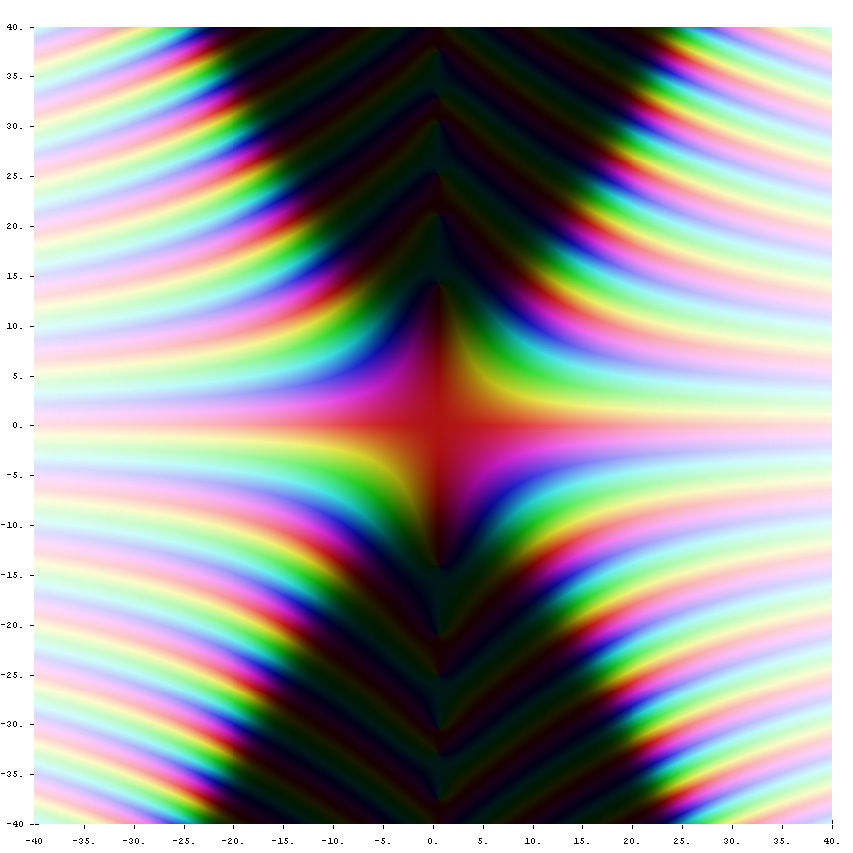Difference between revisions of "Riemann xi"
| Line 4: | Line 4: | ||
[[File:Complex Riemann Xi.jpg|500px]] | [[File:Complex Riemann Xi.jpg|500px]] | ||
| + | |||
| + | =Properties= | ||
| + | <div class="toccolours mw-collapsible mw-collapsed"> | ||
| + | <strong>Theorem:</strong> The values of $\xi$ are known at even integers: | ||
| + | $$\xi(2n) = \dfrac{(-1)^{n+1}}{(2n)!}B_{2n}2^{2n-1}\pi^n (2n^2-n)(n-1)!,$$ | ||
| + | where $B_n$ is the $n$th [[Bernoulli number]]. | ||
| + | <div class="mw-collapsible-content"> | ||
| + | <strong>Proof:</strong> █ | ||
| + | </div> | ||
| + | </div> | ||
| + | |||
| + | <div class="toccolours mw-collapsible mw-collapsed"> | ||
| + | <strong>Theorem:</strong> The following series expansion holds: | ||
| + | $$\dfrac{d}{dz} \log \xi\left( \dfrac{-z}{1-z} \right) = \displaystyle\sum_{k=0}^{\infty} \lambda_{k+1}z^k,$$ | ||
| + | where | ||
| + | $$\lambda_k = \dfrac{1}{(n-1)!} \dfrac{d^k}{ds^k} \left[ s^{k-1} \log \xi(s) \right] \Bigg|_{s=1} = \displaystyle\sum_{\rho} \left[ 1 - \left(1 - \dfrac{1}{\rho} \right)^n \right],$$ | ||
| + | where this sum is over $\rho$, the non-trivial zeros of the [[Riemann zeta function]]. | ||
| + | <div class="mw-collapsible-content"> | ||
| + | <strong>Proof:</strong> █ | ||
| + | </div> | ||
| + | </div> | ||
Revision as of 20:33, 19 February 2015
The Riemann $\xi$ function is defined by the formula $$\xi(z)=\dfrac{z}{2}(z-1)\pi^{-\frac{z}{2}}\Gamma\left(\dfrac{z}{2}\right)\zeta(z),$$ where $\Gamma$ denotes the gamma function and $\zeta$ denotes the Riemann zeta function.
Properties
Theorem: The values of $\xi$ are known at even integers: $$\xi(2n) = \dfrac{(-1)^{n+1}}{(2n)!}B_{2n}2^{2n-1}\pi^n (2n^2-n)(n-1)!,$$ where $B_n$ is the $n$th Bernoulli number.
Proof: █
Theorem: The following series expansion holds: $$\dfrac{d}{dz} \log \xi\left( \dfrac{-z}{1-z} \right) = \displaystyle\sum_{k=0}^{\infty} \lambda_{k+1}z^k,$$ where $$\lambda_k = \dfrac{1}{(n-1)!} \dfrac{d^k}{ds^k} \left[ s^{k-1} \log \xi(s) \right] \Bigg|_{s=1} = \displaystyle\sum_{\rho} \left[ 1 - \left(1 - \dfrac{1}{\rho} \right)^n \right],$$ where this sum is over $\rho$, the non-trivial zeros of the Riemann zeta function.
Proof: █
